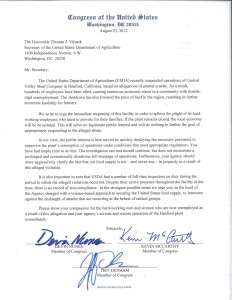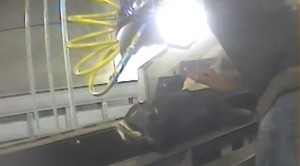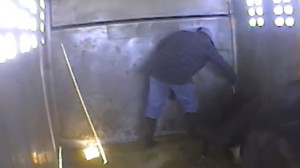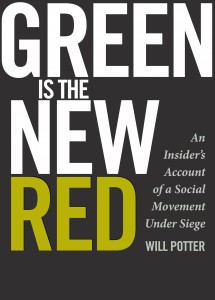Three members of the U.S. Congress have sent a letter to the USDA urging the department to take action against "the onslaught of attacks" by animal welfare groups who have conducted undercover investigations of factory farms.
In a blog post about the letter, one member of Congress equated the recent investigation of Central Valley Meat Co. in California to arson, and called it "economic terrorism."
A nonprofit animal protection group called Compassion Over Killing released undercover video footage that documented shocking cruelty at that California slaughterhouse. The footage shows workers unsuccessfully shooting cows in the head and then walking away as they in pain, and workers suffocating cows by standing on their faces.
Central Valley Meat Co. had not only been inspected by the USDA, it was one of the USDA's suppliers; last year, the USDA bought more than 21 million pounds of beef worth more than $50 million from the company. After seeing the footage, McDonald's, Costco, and In-N-Out Burger cut ties. The USDA shut down the facility pending investigation.
"Onslaught of attacks"That didn't sit well with ag industry groups or their allies, who have been on the defensive as one investigation after another has rattled industrial agriculture. In 2008, an investigation by the Humane Society at another California dairy cow slaughterhouse led to the largest meat recall in U.S. history. Dozens of investigations into all aspects of the industry have exposed the reality of our food choices, and they have completely changed the national discussion.
Bad PR and recalls are one thing, though; the USDA shutting down Central Valley Meat Co. represented another threat entirely.
A few days after the plant was shut down, three U.S. Representatives from California stepped in, and sent a letter to the USDA calling for its immediate reopening. U.S. Representatives Devin Nunes, Kevin McCarthy, and Jeff Denham said that its closure was hurting the economy, and the USDA needed "to intervene against the onslaught of attacks that are occurring at the behest of radical groups."
Who are these "radical groups"?
Nunes spells this out in a blog post about the investigation titled "Eco-extremists Strike Again."
"The video was posted by extremists who are actively working to undermine production agriculture in the United States," he says. "In recent years, these kinds of "activists' have increased their attacks on animal agriculture, and have even carried out acts of domestic terrorism." He points to an arson by the underground activists of tractors and trailers at Harris Ranch, California's biggest beef processor. "Now," Nunes said, "area residents are confronted with economic terrorism."
No one -- not the USDA, not FBI -- have alleged that the undercover investigation of Central Valley Meat Co. has anything to do with the fires nine months earlier.
So where did this idea come from? Why are members of the U.S. Congress conflating undercover investigations by nationally-respected animal welfare groups with arson and "terrorism"?
This is the rhetoric Big Ag has been pushing for years.
Big Ag's Enemy #1: Undercover InvestigatorsFor decades, such talk of "eco-terrorism" was mainly reserved for saboteurs and, at worst, arsonists. But the animal rights and environmental movements have changed. Now, the biggest threat facing Big Ag isn't that activists are breaking windows -- it's that they're creating them. The transparency ushered in through undercover investigations is seen as on par with, or even more dangerous than, more extreme tactics.
| "Now, the biggest threat facing Big Ag isn't that activists are breaking windows -- it's that they're creating them." |
For example, just days after that January arson in California, the Animal Agriculture Alliance -- the leading industry-wide agriculture group -- sent an email blast to its supporters equating the fire with undercover video: "The individuals responsible for Sunday's attack must be brought to justice and report for their destructive actions. It is also imperative that activists be held accountable for their attempts to undermine farmers, ranchers and meat processors through use of videos depicting alleged mistreatment of animals""
When corporate groups call undercover investigators terrorists, and members of Congress urge federal agencies to treat them as such, it's not just chest puffing. It could have dangerous consequences for investigators, and for the rest of us.
AETA and Ag GagLearn more about the history fo the Animal Enterprise Terrorism Act, and how corporations manufactured "eco-terrorism."
This week, the Center for Constitutional Rights is in court arguing that a 2006 law called the Animal Enterprise Terrorism Act is so broad that it wraps up a wide range of conduct as terrorism, including investigations, if they hurt the profits of animal industries. Opponents of the law say that this has had a chilling effect on lawful, non-violent activism. The government has dismissed the concerns, and said the fears are overblown.
Yet according to FBI files I have published on GreenIsTheNewRed.com, the FBI has explicitly considered prosecuting undercover investigators as terrorists as far back as 2003. The documents show FBI agents were considering the charges because activists allegedly "illegally entered buildings owned by [redacted] Farm" and videotaped conditions of animals."
Meanwhile, 10 states have considered their own legislation targeting investigators with harsh criminal penalties. These "Ag Gag" bills in some cases propose criminalizing any video or audio recording of animal abuse. Not surprisingly, the sponsors have close ties to the ag industry, and are liberal in their use of terrorism rhetoric as well.
The Most Damning Exposà �As Mark Bittman wrote in opposition to these Ag Gag bills last year: "Videotaping at factory farms wouldn't be necessary if the industry were properly regulated. But it isn't."
The media smear campaigns by Big Ag groups and politicians are intended to sidetrack the public from that key point: the industry is not regulated. It has insituttionalized practices that most consumers, when educated, find appalling. The multi-billion dollar industry that is animal agriculture is dependent on secrecy, and dependent on politicians bending to its interests.
Perhaps this is the most damning exposà � to result from these investigations. The documentation of animal welfare abuses has unintentionally shined a spotlight on politicians so beholden to corporate interests, so stuffed full of their talking points, that they believe "extremists" are not those who engage in unspeakable animal abuse, but those who non-violently expose it.
Crossposted at Green Is the New Red, videos crossposted at Compassion over Killing








